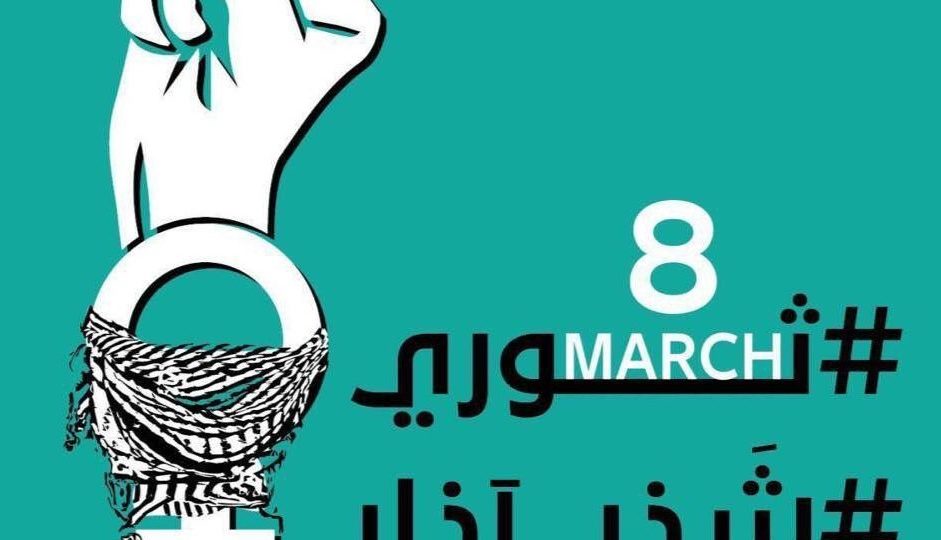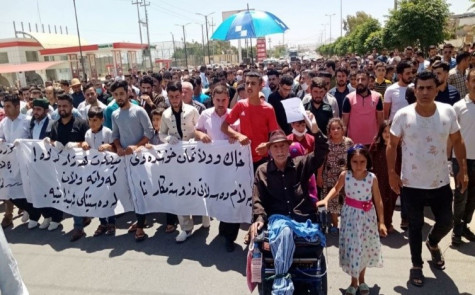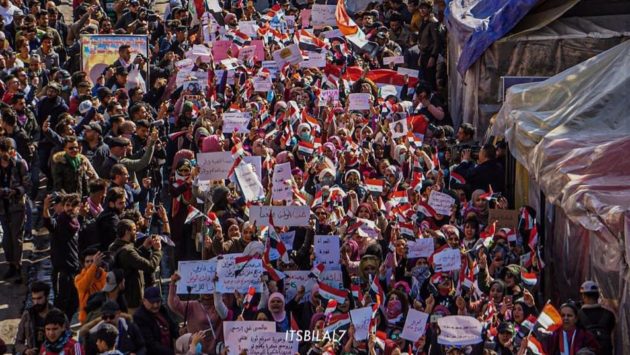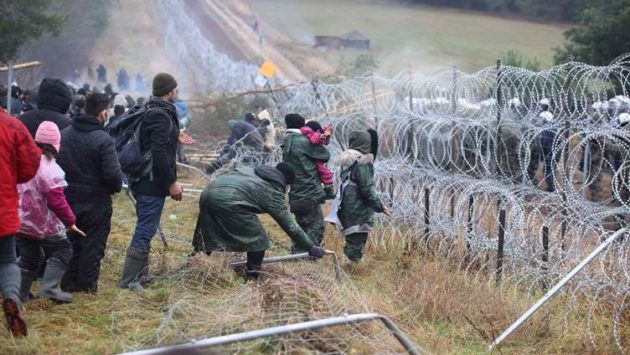The Silent T Feminizing Arabic Words is Silent No More.
Shather Athar: Women’s marches in Baghdad and a number of southern provinces
Iraqi women continue to fight for their right to an active role in Iraqi politics, and continue to make their presence known in the public squares where demonstrations are taking place. Their courage and steadfastness is challenging the dominant societal stereotypes which have long been imposed on them in the name of tradition or religion.
On 8 March 2020 — International Women’s Day — the women of Baghdad (in Tahrir Square), Nasiriyah, Kut, Karbala, Najaf, and Basra (in Bahria Square) organized marches for women’s rights: identifiable by the color turquoise they wore, these brave women marched alongside students of the October Uprising who have organized marches every Sunday for the past 6 months that culminate in peaceful demonstrations in public squares throughout the country.
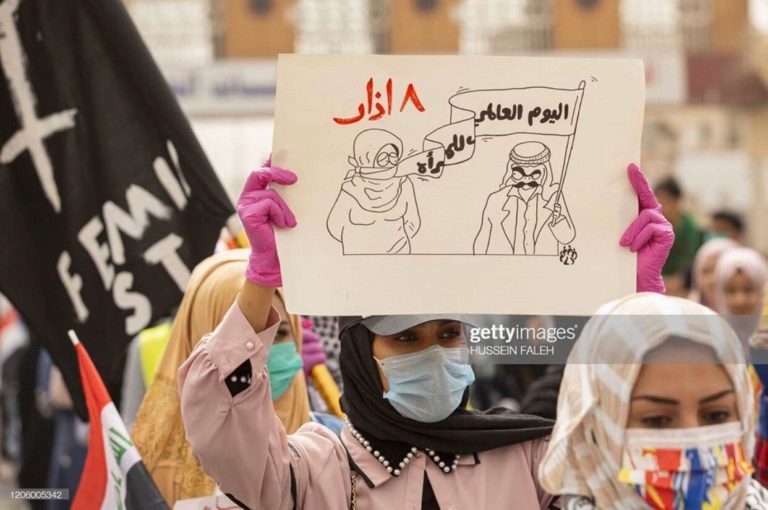
The Iraqi Women Network, in cooperation with prominent women demonstrators, the Youth Union and the Student Union, formed an alliance to organize these marches, choosing slogans that reflected both the feminist and the patriotic principles that inspired them. This alliance decided on the title “Shathar Athar” and designed a logo and an invitation, inviting all Iraqis to come out in solidarity with them.
The mobilization began at the beginning of March using television and social media: the activists involved gave TV interviews in which they spoke about their intention to organize the march and explained its goals. On social media, activists sent invitations asking for people to join in the march, and they were widely shared on pages that covered news of the October uprising. Other young men and women volunteered to create a web page called Shathar Athar, along with the hashtag #Shathar_Athar.
Girls and activists from Basra took up the cause immediately, spreading the invitation on their personal pages, and creating an event on Facebook so that they were able to organize the march in the streets of their city that very day.
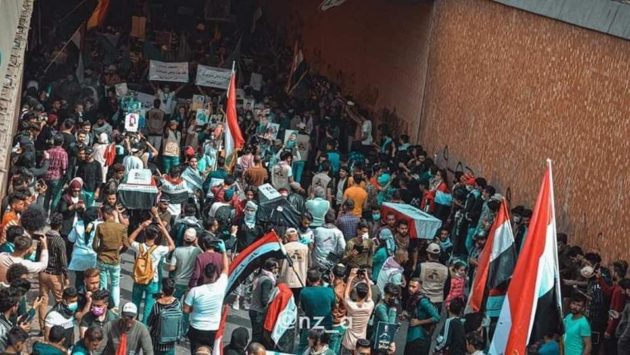
The marches were a big success. As they concluded as demonstrations in public squares in the different cities, voices rang out with words of strength and solidarity: “Your voice is a revolution and not a shame” and “Here are your daughters, our home land … they sacrificed their blood and raised the flag.”
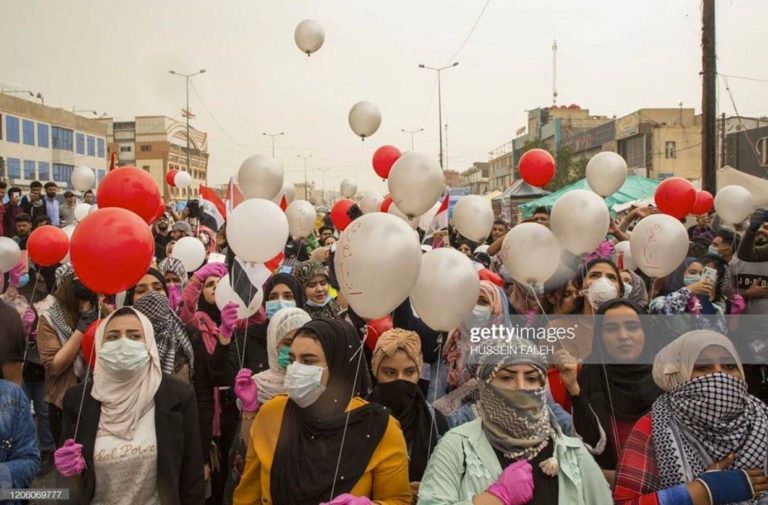
Girls and women of all ages participated in these marches, and they received wide support from the local and Arab media. But this strong sense of solidarity was not only local: women and men from Morocco, Tunisia, Lebanon, Sudan, Palestine and Bahrain all sent messages of their support for and solidarity with Iraqi women.
Roua, one of the activists who called for and participated in one of the marches, said: “These marches are all due to the the efforts of young women, it is the first time that so many diverse organizations got involved and cooperated for marches like this, working together with dedication and selflessness to ensure they would take place. The marches have brought luster and life back to these regions and have topped reporting, not only in Arab but international news.”
The “Shathar Athar” women issued a statement after the marches to all Iraqi women from Baghdad and the provinces who broke restrictions and norms to rise up side-by-side with men against injustice and corruption in order to achieve equality and social justice. Women have contributed to the perpetuation of the ongoing 6-month uprising that started last October, despite the repression, acts of violence and intimidation against both the men and women activists who are taking part. In addition to brutal killings and forced arrests, insults have been hurled against activists, including women in the media and paramedics. Yet the presence of women has been constant, and is a great incentive for young people to continue to persist in their struggle against injustice.
In this statement mentioned above, women called on the United Nations Mission in Iraq and international human rights organizations, such as Amnesty International, to pressure the Iraqi government to conduct an immediate and thorough investigation into the violence committed against peaceful protesters. They want to prosecute and hold accountable the security elements or militias which are behind the senseless killing and cruel abuse of the activists involved.
This statement also clarified their most critical political demands and the tasks that need to be completed at the present time, these included:
1: The formation of a new, temporary, “mini” national government with exceptional powers, devoid of all quota systems and the inevitable corruption they cause. This government must be capable of protecting Iraq from the dangerous pitfalls of political intransigence and external interference.
2: The President of the Republic must take the necessary steps to select and assign a prime minister, in accordance with the constitution and a person who is patriotic, competent, honest and unbiased. The new prime minister must have the ability to make decisions and implement the interim government’s program with independence from regional, sectarian, political, narrow party and external interests.
At the same time, the statement stressed the need for the interim government to assume its duties immediately, and work to achieve the following:
1- Hold early elections within a year at most.
2- Review the election law and ensure that it is fair and equitable.
3- Review the formation of the Electoral Commission to ensure that it is truly independent and able to manage a fair, transparent and credible electoral process, without the corrupting influence of political money and weapons, and with effective international supervision.
4- Announce publicly the names of victims of the uprising, establishing them as martyrs of the people; stop the repression against those participating in the uprisings; release all those who are now detained; annul the procedures for pursuing them; and reveal the fate of the disappeared. Also, they should announce the results of the investigations into the killing of the activists and protesters, and hold those responsible for the crimes committed against them accountable.
5- Initiate serious and concrete measures to combat corruption, and to bring the accused at all levels, especially adults, to justice.
6- Take immediate steps to ensure that all Iraqi people have the basic services they need.
To view the full statement, click here

